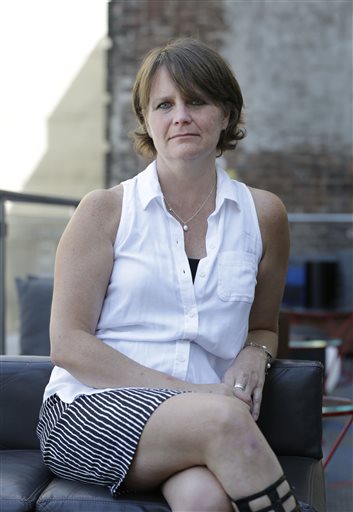Backpage ad site: Aider of traffickers or way to stop them?
By: Associated Press//August 17, 2015//
By MARTHA IRVINE
AP National Writer

CHICAGO (AP) — The adult ads on Backpage.com are endless — written in a sort of risque code to avoid implying something illegal, yet still obvious invitations for sex, adorned with suggestive photos and videos. Many in the fight against sex trafficking loathe the website, particularly since some escorts in the ads have turned out to be minors who’ve been forced into the sex trade.
An Illinois sheriff is among those targeting Backpage and recently helped convince Visa and Mastercard to stop providing payment services to the site.
“Whoever it is that’s facilitating these horrible crimes, we can’t just sit back and say, ‘Well, that’s OK. I guess it’s a business model,'” said Thomas Dart, the sheriff in Cook County, Ill., which includes Chicago.
He spoke to The Associated Press the day before a judge issued a restraining order, preventing Dart from making further comment until a Backpage lawsuit against him — seeking a retraction of his statements to credit card companies and damages for lost revenue — is resolved. Meanwhile, Backpage, with headquarters in Dallas and a parent corporation in Amsterdam, has continued to operate, allowing users to place free basic ads in its adult category.
Backpage attorneys, citing the First Amendment and federal statutes, argue that a public figure shouldn’t be allowed to interfere with a law-abiding company’s ability to do e-commerce.
Liz McDougall, general counsel, has long said that Backpage simply provides space for the ads but doesn’t create the content. And she takes it a step further, claiming that Backpage routinely works behind the scenes with law enforcement to help put traffickers behind bars.
When it comes to fighting sex trafficking, “I am a true believer that this is one of the most valuable tools there is on the Internet,” said McDougall, who’s based in Los Angeles.
At least one anti-trafficking group has been willing to work with Backpage to rescue young women and has accepted substantial donations from the site.
And even as some in law enforcement point a finger of blame at Backpage, others on the front lines of the fight against sex trafficking see the site as an ally — even if sometimes uncomfortably so.
“I don’t feel like demonizing them is the appropriate response. I feel like we should be working with them and focusing on … things that could make a difference,” said Sgt. Grant Snyder, the lead detective on the human trafficking team at the Minneapolis Police Department.
Like officials in other big-city departments, he confirms that he regularly gets information directly from Backpage that helps convict traffickers and rescue victims. “It helps us recover more victims. It helps us recover them sooner.”
Dart says the help hardly justifies the crush of ads the site creates. He estimated that the company, in April alone, published more than 1.4 million adult services ads and made at least $9 million.
Some ads are posted by sex workers such as Grace Marie, a dominatrix in Los Angeles who tweeted recently to complain about Dart’s campaign.
“As a system, Backpage is decidedly anti-pimp. It creates a direct and easy-to-use interface between providers and clients,” Grace Marie said when contacted by the AP. She uses her first and middle names in her work and asked that her last name not be used, citing safety concerns and the fact that her work is illegal.
The bigger concern among law enforcement, however, is sex trafficking.
Victims are not always, as many think, women or children smuggled in from foreign countries to work as sex slaves. Police say sex trafficking is as much a homegrown crime — with victims who could be from just around the corner, controlled by pimps with drugs and alcohol or threats.
Its critics claim that Backpage helps promote this illegal trade.
“How is it possibly legal to help pimps sell kids? Since when is that legal in the United States of America?” asked Erik Bauer, an attorney in Tacoma, Wa., who is representing four young women in a lawsuit against Backpage. They are seeking damages from the site because their convicted traffickers used it to sell them to johns when they were seventh- and ninth-graders.

Besides providing law enforcement with information about who posts an ad, McDougall says that Backpage employees watch the site’s content closely and send suspicious ads to the National Center for Missing & Exploited Children.
In March, for instance, police in Panama City, Fla., arrested two Illinois men — Dashawn Taylor and Kevin Dante Finley — and charged them with procuring a minor for prostitution. Police found the two men with a 16-year-old girl at a Panama City hotel after Backpage reported an ad with a photo of an underage girl to NCMEC’s sexual exploitation CyberTipline.
Still, NCMEC’s top online analysis expert said Backpage could do more to stop repeat ads, for instance.
“Mere reporting has fallen short,” said Staca Shehan, executive director of the center’s case analysis division, which oversees the organization’s child sex trafficking team.
And because age is so difficult to verify, even Backpage’s allies concede that the system is not perfect.
“There’s no question that kids are going to slip through on some of those ads,” said Lois Lee. She is the founder and director of Children of the Night, a residential program in Van Nuys, Calif., for young people, ages 11 to 17, who are attempting to leave prostitution.
By the end of this year, Backpage will have donated $700,000 to Children of the Night since 2012— all of it, Lee said, used to feed, clothe and educate young women who come to her, often by way of police departments across the country, many who work with Backpage. The site also runs public service ads for a Children of the Night rescue hotline.
“You have to deal with people that are actually in the mix,” Lee said, explaining why she works with Backpage — just as she works with vice officers and drug-addicted victims fleeing abuse. “None of it is pretty.”
Teens in her program said that if their traffickers didn’t use Backpage, they’d simply use other sites. And those sites don’t always help police, said Snyder in Minneapolis, noting that he recently tried to get information on a suspected trafficker from a Canadian ad site that declined to cooperate.
“We can’t shut down the Internet. So are we better off having a strategy that turns the very tools that (criminals) use to traffic back on them?” Snyder asked.
Sheriff Dart sees another way — for credit card companies to withhold payment services from the next big “entity” that allows escort ads, as they have Backpage.
“We’re never going to eliminate this,” the sheriff said. “But what we can do is to make it more difficult for the criminals who are involved with this — and make it easier for us to catch them.”
Legal News
- Some State Bar diversity participants walk away from program
- Wisconsin court issues arrest warrant ‘in error’ for Minocqua Brewing owner
- Iranian nationals charged cyber campaign targeting U.S. Companies
- Facing mostly white juries, are Milwaukee County defendants of color truly judged by their peers?
- Milwaukee Mayor speaks in D.C. Tuesday at White House water summit
- Chicago man sentenced to prison after being caught with ‘Trump Gun’
- FTC bans non-competes
- Gov. Evers seeks applicants for Dane County Circuit Court
- Milwaukee man charged in dismemberment death pleads not guilty
- Democratic-led states lead ban on the book ban
- UW Madison Professor: America’s child care crisis is holding back moms without college degrees
- History made in Trump New York trial opening statements
WLJ People
- Power 30 Personal Injury Attorneys – Russell Nicolet
- Power 30 Personal Injury Attorneys – Benjamin Nicolet
- Power 30 Personal Injury Attorneys – Dustin T. Woehl
- Power 30 Personal Injury Attorneys – Katherine Metzger
- Power 30 Personal Injury Attorneys – Joseph Ryan
- Power 30 Personal Injury Attorneys – James M. Ryan
- Power 30 Personal Injury Attorneys – Dana Wachs
- Power 30 Personal Injury Attorneys – Mark L. Thomsen
- Power 30 Personal Injury Attorneys – Matthew Lein
- Power 30 Personal Injury Attorneys – Jeffrey A. Pitman
- Power 30 Personal Injury Attorneys – William Pemberton
- Power 30 Personal Injury Attorneys – Howard S. Sicula











